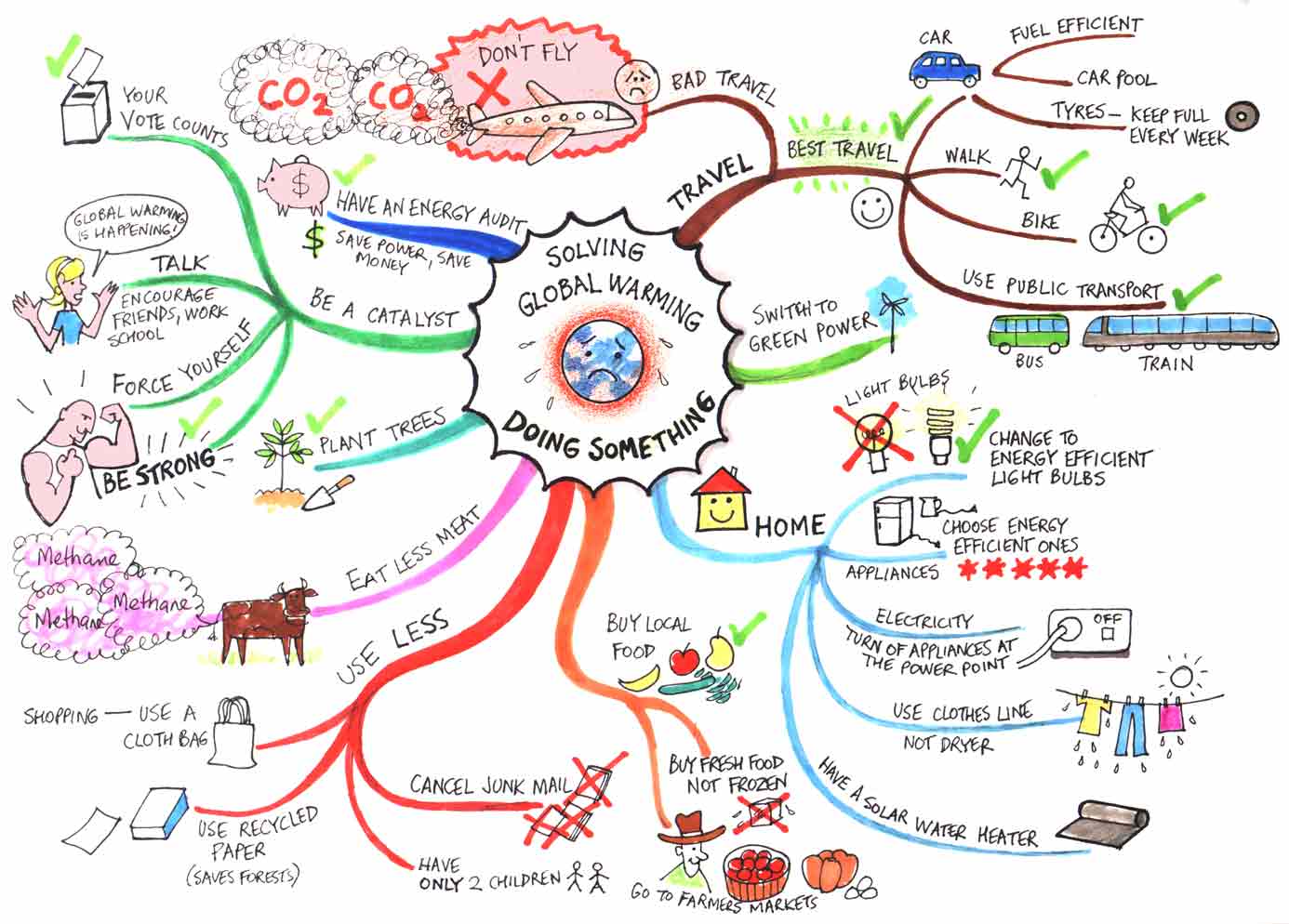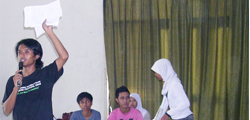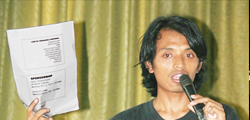Black in News >>>

JADILAH VEGETARIAN!!!
LAKUKAN PENGHIJAUAN!!!
Masak gak terasa sih?
Hujan badai dan hujan es, tsunami, gempa bumi, mengganasnya lumpur lapindo, keluarnya bola-bola api di lautan, gagal panen, epidemi 30 jenis penyakit baru (exp; flu burung, sapi gila, flu babi, dst), makin mewabahnya penyakit yang disebabkan serangga(exp: demam berdarah, malaria, cikungunya), banjir dan kekeringan, perubahan iklim yang ekstrim, mencairnya es di kutub, permukaan air laut meninggi, abrasi pantai, kesulitan air bersih, jatuhnya perekonomian.
Trus, trus apa hubungannya ama kita - kita (situ ok!!! hahaah) toh kita juga masih sehat walafiat juga kan? Tapi...
Kata Mr. Stephen Hawking, ahli fisika kelas dunia, "Hati - hati..., ancaman perang nuklir sudah lenyap, tapi bakalan ada yang jauh - jauh lebih parah. Kalo perang dunia hanya membunuh ratusan ribu orang tapi pemanasan global bisa membunuh jutaan orang ...."
Sedangkan Mr. Gregroy R dari Universitas ternama di AS, Northwestern, lebih serem lagi nyeplosnya, "Pemanasan Global bisa menyebabkan ledakan gas metana yang besarnya 10.000 kali lipat dari pada ledakan yang ditimbulkan seluruh nuklir di dunia. Juga dapat menyebabkan lautan api dan banjir yang maha besar dan juga menjadi penyebab kepunahan 90% spesies laut dan 75% spesies dara."
Ngebohong kali tuh orang, masa sih?
Mr. Zwally dari NASA, "Es kutub akan lenyap pada akhir musim panas 2012. Konon es kutub berfungsi memantulkan 80% panas matahari yang sampai di bumi. Kalau es menyusut, maka air laut makin hangat, bumi makin panas. Trus.... gas metan terlepas di lautan. Gas itu ternyata sangat banyak dan cukup untuk membunuh semua spesies di dunia"
Hiiii... jadi sereeeemmmm banget kan? Sekarang saja sudah begitu banyak bencana dan masalah terjadi, sungguh tak terbayangkan bila kelak semua es di kutub menghilang? wawwwww serem, ngebayang pelm 2012 ajah....








 Dapat kita bayangkan, bagaimana sakitnya hati ini, bagaimana frustasinya hidup ini, ketika mengetahui orang yang kita cintai ternyata sudah ada yang punya. Sudah ada yang memiliki. Sudah ada yang meng-hak-i. Begitulah gambaran dari lagu Goodbye yang kini video klipnya sudah dapat disimak di sejumlah televisi nasional.
Dapat kita bayangkan, bagaimana sakitnya hati ini, bagaimana frustasinya hidup ini, ketika mengetahui orang yang kita cintai ternyata sudah ada yang punya. Sudah ada yang memiliki. Sudah ada yang meng-hak-i. Begitulah gambaran dari lagu Goodbye yang kini video klipnya sudah dapat disimak di sejumlah televisi nasional. JADILAH VEGETARIAN!!!
JADILAH VEGETARIAN!!! This statement from a Mississippi senator at the one hundredth birthday of former South Carolina senator Strom Thurmond may sound like benign birthday flattery—if it weren’t for the fact that Thurmond’s 1948 presidential campaign promoted racial segregation. A young ABC News reporter assigned to cover the event concluded that Lott’s comment might imply that he also supported segregation. The reporter thought he had a major news story. But ABC’s senior staff disagreed, deciding to run the story briefly on television at four-thirty in the morning and to publish a short piece about it on its Web site. By the next day, the story was effectively dead in the mainstream press.
This statement from a Mississippi senator at the one hundredth birthday of former South Carolina senator Strom Thurmond may sound like benign birthday flattery—if it weren’t for the fact that Thurmond’s 1948 presidential campaign promoted racial segregation. A young ABC News reporter assigned to cover the event concluded that Lott’s comment might imply that he also supported segregation. The reporter thought he had a major news story. But ABC’s senior staff disagreed, deciding to run the story briefly on television at four-thirty in the morning and to publish a short piece about it on its Web site. By the next day, the story was effectively dead in the mainstream press.

